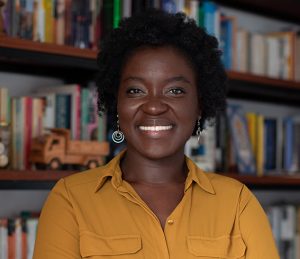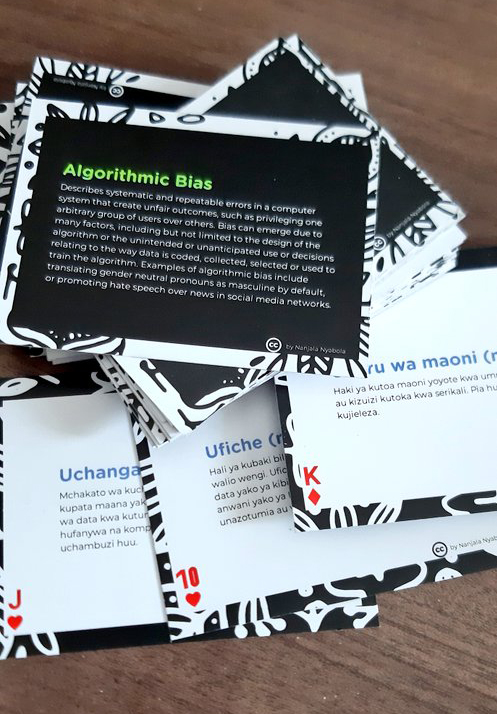PACS Blog / July 21, 2021
Breaking the Language Barrier on Digital Rights in Africa
The Kiswahili Digital Rights Project is expanding digital rights vocabulary in Africa and communities around the world, popularizing key terms in digital rights and technology into Kiswahili through a material set of flashcards.

Nanjala Nyabola is an independent writer and researcher based in Nairobi, Kenya who is currently part of Stanford PACS’s Digital Civil Society Lab and Center for Comparative Studies for Race and Ethnicity (CCSRE) Practitioner Fellowship. This interview is edited for length and clarity.
Can you give us the context for the Kiswahili Digital Rights Project, for the creation of the flashcard deck – what is the language environment in Kenya and Africa?
Kenya is an incredibly multilingual society. There are at least 42 indigenous languages spoken in Kenya, not to mention ‘sheng’ which is a patois that takes bits and pieces from all the languages it encounters and adapts them to suit various conditions. But this project isn’t just about Kenya. Kiswahili is the most widely spoken African language in the world. It is an official language in Kenya and Tanzania, and the language of commerce in Uganda, Rwanda, as well as parts of Zambia, Malawi, the Comoros, and Mozambique. It is the only indigenous African language that is an official language at the African Union and – if curriculum changes allow it – the only one to be taught in South African and Namibian schools. With an estimated 140 million speakers, it is the most widely spoken language in the biggest language family on the continent, so if you’re going to do a language project to show the importance of digital rights in languages other than English, Kiswahili is the most natural place to start.
Technology is increasingly important to public life in Kenya. By now, anyone who works in tech has heard the numbers and the stories – the highest use of mobile money in the world, 83% internet penetration rate, 41% of the population using the internet every day. We have an administration that has pursued a “digital-first” approach to governance. What we don’t have is a comprehensive rights environment that can keep up with these developments. We are at the stage where there’s a great collection of passionate people who are driving the conversation on digital rights but not a general consciousness of why certain things are wrong or in violation of our rights. And my hypothesis is that language is a big part of why this is happening.

Besides scholarly work on the subject, is this project the first practical attempt to introduce new terminology for the mainstream use in Kiswahili?
There’s been a lot of translation work with Kiswahili more broadly just because it is so widely spoken. There is the Kiputiputi dictionary of Computers and Technology for example, and Google did have a translation team in East Africa for some time. What’s really missing is the digital rights piece. The government can come up with a catchy name for their digital ID project but can’t explain to the public how that digital ID will affect their constitutional rights because the linguistic context around which digital privacy and data protection matters has not been created. So it’s really this digital rights piece – and in a popular way that faces lay audiences first before it faces the academy – that is missing, and that is what this project aims to fill.
Around the world, English is a dominant language of technology, human rights and democracy, and “progress” in general. Do you think efforts like yours can help expand the native identity layers, making people bring their whole selves into the digital realm?
I don’t know if I would say progress in general. I would say that English has an advantage because so much of the world was forced to speak it as a second language as a result of historical imperialist practices on the part of Western nations. As second language speakers, we often break and mold the language to fit our local context and goals, since context is an important factor for what matters in language. But molding the language in this way means that we are only taking what is useful to us. The trouble with the English of the internet is that it is very difficult to break in a way that makes it useful, and that makes it hard to articulate why we need the internet and digital technology to be shaped in a certain way. When it comes to rights especially, I think it’s bad advocacy to articulate rights solely on the basis of law. I think good advocacy gives people as many tools as possible to articulate their hopes, dreams, and desires in their own terms, and language is a core part of doing that.
Who are the people you hope to embrace with this vocabulary? Why is that important?
I’m hoping that these words and concepts become an organic part of digital rights advocacy in Africa. I’m hoping that experts and practitioners in the field use them. Most of all, I’m hoping that we can distribute them widely to young people, especially those who are growing up in a digital-first world so that they can have more agency in shaping their digital futures. I’m constantly thinking about how an estimated 60% of Kenya is below the age of 35 and we aren’t even the youngest country in East Africa – let alone on the continent. This is a generation that doesn’t remember what the world looked like before the Internet. Have we given them the tools to defend their digital rights adequately? Do they have the language they need to say why they will or will not tolerate certain actions taken by their governments? These are the people I hope will most use these tools.
What are the main obstacles to implementing the new vocabulary into native languages? How do you look to build context?
I think part of the challenge is that tech innovation is still very much centralized around a handful of nodes – Silicon Valley, China, Japan etc. More than technical capacity it’s about money and capital. The best funded tech projects are clustered around these nodes and so most of the tech that actually goes from idea to implementation orbits around them. African developers have such a hard time finding funding or exits for their projects, and when they do it’s partly because they have found a way of articulating their financial case to Western (or increasingly Chinese) donors. By extension, that means they’ve found a way to articulate their project or idea in English. So we need more money to go into tech in Africa and not just from foreign investment: ideally, public funding in the way that universities and university grants are the backbones of what Silicon Valley is able to do. We need people to build the tech that African people want or need, not the tech that Western investors and venture capitalists want to fund. Hopefully, language will grow organically as a concern in this space – that if we are building tech that people in African language communities want then it should be and will be in the languages that they speak.
This project was developed within your Digital Civil Society Lab (DCSL) and Center for Comparative Studies for Race and Ethnicity (CCSRE) Practitioners Fellowship. Can you describe how this program helped you launch it?
I’d had the idea for some time because I kept hitting this language wall with all the digital rights advocacy work that I was involved in. Our circle just wasn’t growing so we were always circulating with each other. The digital ID situation with the Huduma Number in Kenya in 2019 was the straw that broke the camel’s back. The government tried to threaten us into taking up these digital IDs, to deny us key services like renewing passports or driver’s licenses if we didn’t use the numbers. The advocacy really only came together because of the Nubian Rights Forum and the litigation that they used to take the government to court and demand a data protection law. In the aftermath, I just remember feeling like: “Where is everyone? We are supposed to be one of the most digitally connected countries in Africa – where is everyone? Where is the daily conversation on this?” After that experience, I knew I had to take a strategic retreat to do some background work. The DCSL/CCSRE program provided the funding that not only allowed me to take that break and do the intellectual work, but also to bring together some of the leading thinkers and practitioners in Kiswahili language to make it happen. The Fellowship network has also been amazing. I think the people who are there – both coordinating and participating – are fantastic. I’m so inspired by the work that everyone is doing. I love being able to run to them for advice and insight on a whole host of things because, truthfully, I’m not really a techie. I love the conversations we have and the way we are able to connect the dots between our individual work and its collective impact.
To learn more about Nanjala’s work and purchase the flashcards for yourself, visit her website.
